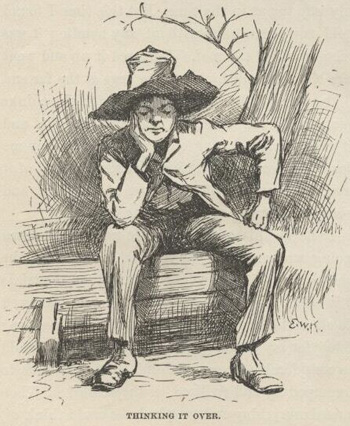
Your complimentary articles
You’ve read one of your four complimentary articles for this month.
You can read four articles free per month. To have complete access to the thousands of philosophy articles on this site, please
A Moral Education
Moral Education for Digital Natives
Laura D’Olimpio discusses the moral role for teachers of digital denizens.
Much is made these days of the fact we live in a post-truth society, and that, despite our instant access to more information than ever before, we still seek out the stories that reinforce our existing beliefs and biases. What role should educators play in assisting digital natives to navigate this murky online realm?
‘Post-truth’ was the Oxford Dictionary Word of the Year for 2016, defined as ‘relating to or denoting circumstances in which objective facts are less influential in shaping public opinion than appeals to emotion and personal belief’. This phenomenon is not new: there have always been tricksters, scammers, and cheats. Yet social media have the tendency to amplify: both constructive and destructive voices have become more urgent and sensationalised than ever previously. Students require the skills that enable them to critically sift through the vast amount of information on the net, yet they also need to engage compassionately with diverse ideas. So we need to educate them to engage with these media in a critical as well as compassionate manner. How can we encourage students to be not only critically engaged with all they see and hear, but also compassionately engaged with others whose beliefs and ideas differ from their own? Specifically, how might we teach young people to challenge fake news, be wary of alternative facts, and be kind to others they chat with in cyberspace?
Teaching children to be critically-engaged democratic citizens, to be ethical and compassionate, are values parents and educators alike hope to cultivate. But first we might well ask, exactly whose job is it to teach ethics? Good thinking skills, reasonableness, tolerance, and discernment with respect to what and who to trust are obvious skills the education system should aim to nurture. But what about caring or kindness? Should teachers have a role to play in teaching children to be compassionate? Or is that a role that ought to be confined to the domestic space? Moreover, if teachers do have a role to play in educating compassion, how should they go about it? Should they be role-models, employing compassion themselves? And if so, what happens when a student disobeys a rule? Should the teacher be caring and kind and not worry about enforcing an appropriate punishment because to do so may be deemed a denial of compassion in classroom proceedings? Sometimes being forgiving, kind, and compassionate is in tension with following the rules and upholding certain standards.
Ethics & Compassion
This potential tension between compassion and rules is familiar to moral philosophers. The restraints of rule-bound or duty-bound ethical action often leave very little room for sympathy or sentiment. Consider Immanuel Kant’s categorical imperative for moral action: ‘Do what you would will to become a universal law’. No exceptions. However, David Hume, who, Kant said, woke him from his dogmatic slumbers, held the opposite position. For Hume, whether we like it or not, it is sentiment, including compassion, that guides our moral decision-making. “Reason always is, and only ever ought to be the slave to the passions,” he famously intoned in A Treatise of Human Nature (1738).

Illustration from Huckleberry Finn
These two sides of this debate – Kant’s objective moral rules on one side, and Hume’s subjective notion of ‘fellow feeling’ on the other – seem a little extreme. Perhaps we can find some middle ground by returning to an Aristotelian sense of virtue to support ethical decision making, and, in particular, to the concept of care. So although rules need to be in place to ensure fairness, surely there is also an important role for intelligent emotions such as compassion or care?
Contemporary philosopher and neo-Aristotelian Martha Nussbaum writes about the need to cultivate a sympathetic imagination. Policies are enforced and rules are applied in a context, and so, in order for actions to be respectful, a moral agent’s ‘inner eyes’ must become attuned to specific situations. Adopting the perspective of another – ‘putting ourselves in their shoes’ – is trying to understand the situation, thoughts and actions of those who differ from ourselves, hopefully activating appropriate emotional responses such as sympathy or compassion.
One way this ethical mode of attention may be cultivated is by giving children the opportunity to practise sympathetic imagination in relation to characters in books, films, and TV shows, as well as online. For example, I can get some idea of what slavery is like even though slavery has not been legal in my lifetime, by reading Huckleberry Finn (1884), which is set in Missouri in the mid-1800s. I can also learn more about racism by reading this book, and apply its other universal themes to the time and place in which I live, too. Because of the skillful way Mark Twain has depicted the events and characters, I can feel compassion towards the characters and the situation they find themselves in, putting myself in the shoes of Huck and Jim even while knowing that this is a work of fiction.
We can learn from fiction because fundamental human experiences are universal. Indeed, it may initially be easier to feel sympathetic to fictional others. This makes works of fiction and narrative art an ideal training ground for moral sentiments.
Becoming Cyber Civil
Learning to engage compassionately with others using stories is a great pedagogical practice that can occur at home or in the classroom. Yet how does this apply online?
The internet can open up a world of educational possibilities; but it can also create echo chambers where individuals only reinforce their extant biases and myths. Whether we are playing a game, chatting to avatars, or actually know the person with whom we are communicating, social media encourages quick responses to ideas, images, and information. It becomes all too easy to forget that the person on the other end of our comment is a human being with thoughts and feelings much like our own.
Educational spaces have not kept up with the rapid rate of technological change, and most young people learn to use social media informally, from their peers or simply by using it, rather than from being taught how at school or by their parents or guardians. So although digital natives have been raised with this technology, this doesn’t mean they know how to use it ethically, critically, or with care and compassion.

The only way people will be civil online is if they are civil generally. And the only way people will use technological tools democratically and inclusively is if they are already committed to being democratic and inclusive. So in order to avoid online bullying and trolling, for instance, empathetic habits must be nurtured in young people in the hope that such caring dispositions become habitual responses to others, both face-to-face and online. Such attitudes, including reasonableness and compassion, must be educated initially as well as being socially supported, online as well as face-to-face. There are some things we must learn by doing, and this includes practical wisdom and virtuous habits. In order to cultivate these virtuous habits, we must practice them. And a good way to practise being compassionate is by engaging with the stories of others, and participating in an ethical community, even if that is a virtual, global community. And being appropriately compassionate involves knowing how to be appropriately compassionate, then actually performing compassionate actions, not simply having the desire to be kind.
In terms of what this means for teaching practices, curriculum concerns, and student learning, it means there is a requirement to teach users of social networking sites to be democratic, critical, and ethically engaged. So there is still a role for educators and educational institutions to play, in face-to-face spaces as well as online. Safe classroom spaces may teach students how to engage compassionately with others while still being critical and discerning of the ideas under discussion. Students might also practise these skills in classes that incorporate the use of moderated online forums.
Critical yet caring dialogue is a crucial skill that’s learned and refined through practice. One example of this is the philosophical method known as the Socratic Method, particularly when practised in a ‘Community of Inquiry’, an approach used by practitioners of Philosophy for Children. Any such techniques explicitly attend to the skills of good dialogue, including charitable argumentation and the logical progression from premises through to justified conclusions. Additionally, this method prioritizes including and hearing various voices.
Educating Twenty-First Century Citizens
Humans are great innovators, and we can be creative and flexible in our pedagogical practices. Moreover, for as long as society exists there will be a role for educators to help children learn critical thinking skills, caring dispositions, and how to work together collaboratively. If such skills can be developed, students will have the best chance of becoming critical, caring, and reasonable citizens who engage ethically and democratically with others both face-to-face and online. They become people who will seek to understand views other than their own, rather than merely looking to have their own point of view affirmed and reinforced. The teaching tool of philosophical dialogue is one way this sort of holistic education can occur in a classroom setting. Teachers of Philosophy For Children, for instance, aim at producing reasonable democratic citizens whose transferable thinking tools will provide them with a good set of vocational skills supported by moral intentions and appropriate emotional and behavioural dispositions.
Students require skills that will enable them to analyse the information accessible online; yet they also need to engage compassionately with diverse ideas and with others. Although digital natives have been raised with connective technology, this is not to say they know how to use it ethically, critically, or with care. Empathetic habits should be nurtured in young people with the hope that such caring dispositions become habitual responses to others, both online and face-to-face. Schools can provide students with safe spaces in which to practise being compassionate as well as critically engaged.
© Laura D’Olimpio 2018
Laura D’Olimpio is Senior Lecturer in Philosophy at the University of Notre Dame, Australia. Her book, Media and Moral Education: A Philosophy of Critical Engagement, is published by Routledge.






